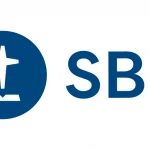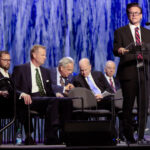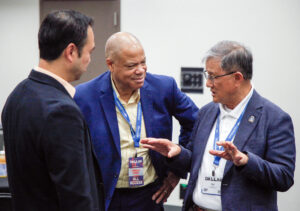

Do you remember running to the closet door to get measured, looking with awe at how much you had grown since last time Mom or Dad held the ruler on your head and marked your height on the door frame?
When we are young, life seems fixed. Though we grow every day, change is so incremental that we are unaware—until we notice our pants are shorter, our shirt seems to have shrunk, our hair has grown too long . . . or the mark on the door frame is higher than last year’s!
As time passes, we learn that change is inevitable. Sometimes change brings excitement and joy. Other times it brings fear and uncertainty and feelings of deep pain and loss. Whether in joy or pain, we learn that there is one constant in life—God is still on His throne and He still cares about me.
If we were to stand on a promontory and look down the back trail of our lives, we would see numerous curves and switchbacks and rough terrain, often interspersed with dappled meadows and gentle streams. Above all, we would see that the landscape changed with each passing step. The same holds true if we look down the back trail of the history of the Southern Baptist Convention. In the past five years alone, the Southern Baptist family has experienced significant change. Since the Great Commission Task Force presented its report in 2010, these current realities have developed.
- The International Mission Board has targeted Unengaged, Unreached People Groups, broadened its ministry statement to provide assistance to NAMB for reaching overseas people groups that have relocated to the shores of North America, and expanded its strategic approach to global missions to include training and deployment of retired business professionals, expatriate Americans working with international companies, and other adaptations in recognition of twenty-first century “flat earth” changes in global structures.
- Since 2011, hundreds of churches have stepped forward to engage previously Unengaged, Unreached People Groups (UUPGs), resulting in an increase in the number of people groups at least initially engaged with the Gospel.
- IMB has also transitioned from two presidents, both from the Builder generation, both in their late 60s or early 70s, to a young Gen-X author, conference speaker, former pastor, and visionary leader in his mid-30s.
- After five years of leadership of another former pastor, NAMB has transitioned into a premier church-planting and ministry evangelism network, complete with an emerging “farm system” of student missionaries, church planting interns and apprentices, church planters, and church planting catalysts. The missions agency is focusing its strategy on thirty-two “Send Cities” across North America, drawing together thousands of pastors and potential church planters to help launch a local-church-driven church planting network through numerous Send North America conferences in various parts of the nation.
- The Ethics and Religious Liberty Commission and Midwestern Baptist Theological Seminary have both entered new chapters in their respective ministries, both now led by dynamic Gen-X leaders who are theologically astute, culturally informed, and fluent in new media and digital communication technologies.
- LifeWay Christian Resources launched The Gospel Project, its new Sunday school curriculum that has exceeded all expectations.
- LifeWay has also sold its sprawling fourteen-acre downtown Nashville campus with plans to relocate to a leaner headquarters as it continues its transition from primarily producing print resources to becoming a global leader in developing quality digital Christian resources for churches and church members.
- Golden Gate Baptist Theological Seminary has sold its Mill Valley campus and is in the process of relocating its main campus to Southern California while seeking permission from the Convention to change its name to Gateway Seminary of the Southern Baptist Convention.
- The six CP-funded SBC seminaries are on the cutting edge of adult education and ministerial training delivery systems and currently enroll perhaps the largest number of seminarians taking one or more courses of study in the history of Christendom. According to an ATS report earlier this academic year, each of our six seminaries is in the top ten of enrollment of all divinity and theological schools accredited by the Association of Theological Schools.
- GuideStone Financial Resources has expanded its ministry to include providing investment opportunities to members in the pew to strengthen its ability to take care of those who serve the Lord by expanding its “economies of scale” in order to remain competitive in today’s market.
- Earlier this year GuideStone received, for the fourth consecutive year, a prestigious Lipper Award for investing excellence and funds performances.
- The SBC has elected its first African American president, by acclamation, twice, and has seen a dramatic increase in the number of ethnic, racial, and language churches joining with the Convention as they embrace the vision of “eliciting, combining, and directing the energies of the Baptist denomination of Christians, for the propagation of the Gospel.”
- The SBC Executive Committee elected a new leader in 2010 who is completing his first five years of tireless efforts to build confidence in cooperation across every level of Southern Baptist life and rebuild appreciation and support for cooperative giving through the Cooperative Program.
- The Executive Committee, in concert with the North American Mission Board, has appointed four ethnic advisory councils to assist Convention leaders in understanding and appreciating the valuable contributions ethnic churches and church leaders make in our joint efforts to reach all people in America with the Gospel.
- The Executive Committee has appointed four other advisory councils to assist its president in his continuing work with the SBC’s Great Commission Council leaders and in his role as “chief encouraging officer” of the SBC—the Calvinism Advisory Council, the Mental Health Advisory Group, the Intercultural Educational Summit, and the Bivocational and Small Church Advisory Council.
- The Executive Committee commissioned two surveys about the Cooperative Program and discovered that confidence that “the CP supports SBC ministries and missions valued by the churches” increased from 73 percent in 2012 to 81 percent in 2014.
- With the recent announcement that the executive director of the Alaska Baptist Convention is retiring and the spate of newly-elected state executives assuming leadership roles in Michigan, New England, and Florida, this brings the number of changes in executive director leadership to twenty-one of the forty-two state Baptist conventions that cooperate with the SBC. That’s one-half. In five years.
Meanwhile, in response to the recommendations of the Great Commission Task Force (GCTF) in 2010, the following changes have also taken place.
- The SBC Executive Committee has reduced its portion of national Cooperative Program funds from 3.40 percent, to 3.20 percent, then to 2.99 percent, forwarding the balance to the IMB.
- The SBC Executive Committee has taken the lead in promoting the Cooperative Program through scheduling scores of pastor listening sessions across the nation, issuing the “1% CP Challenge,” and enlisting a Cooperative Program Advisory Committee comprised of state Baptist convention leaders, SBC entity leaders, and pastors. That group continues to flesh out and refine the Great Commission Advance, a ten-year initiative designed to “facilitate maximum support for worldwide missions and ministries.”
- The state Baptist conventions have taken numerous proactive steps to respond to the messengers in their respective states by reducing state staff, reducing real property holdings, and directing greater percentages of Cooperative Program funds from state-level ministries to SBC missions and ministries.
- The state Baptist conventions have moved from forwarding an average of 36 percent of their CP funds to SBC causes per year during the decade prior to the GCTF to more than 38 percent per year over the past five years—at the same time total plate offerings from individual church members to their churches declined by more than $900 million.
Time does not permit a rehearsal of the cultural forces that continue to shape our world—from the invasion and annexation of Crimea, to the normalization of homosexual practice and same-sex marriage in the United States, to the persecution of Christians and other religious groups at the hands of the self-proclaimed ISIS. Change is inevitable, both for good and ill.
In the face of all of these changes, the timeless truth that our God does not change comes as a refreshing breeze on a hot and weary day. The expanse of His love has not diminished. The wideness of His mercy has not decreased. The power of His Gospel cannot be suppressed. His compassion and providential care for His children remains constant. The Word of the Lord lifts us up, gives us hope, and sets our feet on the path of joyful obedience to the Great Commission. For I am the Lord, I do not change; Therefore you are not consumed, O sons of Jacob (Malachi 3:6, NKJV).
Roger S. Oldham is vice president for Convention communications and relations for the SBC Executive Committee and is a member of Long Hollow Baptist Church in Hendersonville, Tennessee.

Co-chairmen Daniel Sanchez and Bobby Sena present the Hispanic Advisory Council’s Final Report to SBC Executive Committee President Frank S. Page during their fourth and final meeting on March 20–21, 2014, in Atlanta, Georgia. Photo by Roger S. Oldham.

Chairman K. Marshall Williams, joined by members of the African American Advisory Council, present the Council’s Final Report to Page during its final meeting on June 12, 2014, in Baltimore, Maryland. Photo by Roger S. Oldham.


At the Intercultural Educational Summit, hosted by Page and chaired by (then) Union University President David S. Dockery on April 2, 2013, in Nashville, Tennessee, representatives from the six SBC seminaries listened to and shared with various racial and cultural leaders from across the Convention. Photos by Rebecca Wolford.

The Calvinism Advisory Group, appointed by Page, discusses its report, “Truth, Trust, and Testimony in a Time of Tension,” at the CP booth in the SBC exhibit hall during the SBC annual meeting, June 10, 2013. Photo by Adam Covington.

Members of the Asian American Advisory Council meet with Page, EC staff, and LifeWay leaders during the Council’s second meeting on March 13–14, 2014, in Nashville, Tennessee. Photo by Oudone Thirakoune.

Breaking up into small groups during its second meeting, members of the Multi-Ethnic Advisory Council discuss the biblical basis for evangelism and other topics. Photo by Roger S. Oldham.

Bivocational and Small Church Advisory Council members listen as EC Hispanic Consultant Bobby Sena leads a devotional during its first meeting on September 11–12, 2014, in Atlanta, Georgia. Photo by Diana Chandler.

Popular speaker, author, and pastor David Platt participates in a panel discussion prior to the SBC annual meeting in Houston the year before his election as IMB president. Photo by Hannah Covington.

Tom Elliff, delivering his first report to the SBC as IMB president in Phoenix, Arizona, in 2011, challenges churches and messengers to reach the world’s 3,800 Unengaged, Unreached People Groups. Photo by Baptist Press.

NAMB President Kevin Ezell addresses trustees during their February 5, 2014, meeting in Indianapolis, Indiana. Photo by Susan Whitley/NAMB.

NAMB President Kevin Ezell (left) and IMB President Tom Elliff meet on April 25, 2011, to brainstorm new ways to partner in reaching the lost, resulting in ministry statement change requests by the two boards. Photo courtesy of IMB.

ERLC President Russell Moore (second from right) participates in a November 13, 2013, immigration reform meeting in the Oval Office with President Obama, Vice President Joe Biden, and religious leaders. White House file photo by Pete Souza.

Trevin Wax (center), managing editor of LifeWay’s The Gospel Project, joins now-IMB President David Platt and EC President Frank S. Page in a panel discussion at a breakfast meeting during the 2014 SBC annual meeting in Baltimore, Maryland. Not pictured is panel host Ed Stetzer. Photo by Carol Pipes.

Thom Rainer (inset), president of LifeWay Christian Resources, in a meeting with LifeWay trustees February 2–3, 2015, explores opportunities to better utilize LifeWay’s downtown Nashville, Tennessee, corporate offices, resulting in the sale of its 14.5-acre property. Photos courtesy of LifeWay.

Jason Allen (right) signs The Baptist Faith and Message at his inauguration as Midwestern Baptist Theological Seminary’s fifth president as Kevin Shrum, board chairman, looks on. Photo courtesy of MBTS.

Golden Gate Baptist Theological Seminary has purchased a six-story building in the Los Angeles area to anchor its new campus by the summer of 2016. The seminary also requested approval for a name change to Gateway Seminary of the Southern Baptist Convention. Photo courtesy of GGBTS.

GuideStone Financial Resources President O. S. Hawkins speaks to SBC Executive Committee members explaining GuideStone’s request to expand its services to better serve “the pastor at the crossroads.” Photo by Morris Abernathy.

GuideStone Chief Operating Officer John R. Jones, President O. S. Hawkins, EC President Frank S. Page, and GuideStone Chief Investment Officer Roddy Cummins receive the Lipper Award during a dinner ceremony March 8, 2012, in New York City. Photo courtesy of Baptist Press.

Golden Gate Seminary President Jeff Iorg signs documents for the 2014 sale of its Mill Valley campus as the seminary begins the relocation process to Southern California. Photo courtesy of GGBTS.

“Truth, Trust, and Testimony in a Time of Tension” is published in the Summer 2013 issue of SBC LIFE for review at the SBC annual meeting. Image by Andy Beachum.

Fred Luter, pastor of Franklin Avenue Baptist Church in New Orleans, points to heaven when he is elected as the first African American president of the SBC in 2012. Photo by Kent Harville.

A comparison of responses to the 2012 and 2014 Cooperative Program Omnibus Surveys to the statement “The Cooperative Program supports SBC ministries and missions that my church values.” Image by Andy Beachum.

Fred Luter preaches during the Sunday evening session of the 2013 SBC Pastors’ Conference just prior to his election two days later to serve a second term as president of the Southern Baptist Convention. Photo by Thomas Graham.

The “1% CP Challenge” was issued by Frank S. Page to the messengers of the 2011 SBC annual meeting in Phoenix, Arizona, during his first report as EC president. Image by Andy Beachum.

A. B. Vines (right), pastor of New Seasons Church in Spring Valley, California, hosts EC President Frank S. Page during a pastors’ listening session in the spring of 2014. Photo by Mike Carlisle.

















